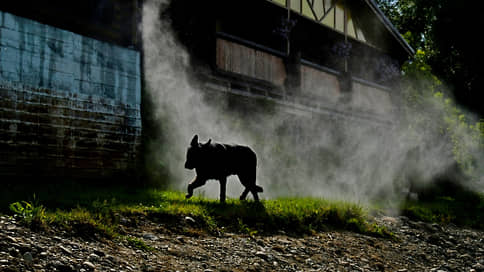The deputies let the dogs go to the regions – Kommersant
[ad_1]

On Tuesday, the State Duma adopted in the first reading a bill allowing regions to choose their own way to control stray animals. Despite the almost unanimous approval, the document raised a lot of questions from parliamentarians. Its wording does not give a clear answer whether it is possible to euthanize stray dogs. And the deputy chairman of the committee on ecology, Vladimir Burmatov, admitted that the current legislation could also effectively solve the problem of stray animals, if “not to steal”.
In April amendments to the federal law about the responsible treatment of animals was introduced by a group of deputies headed by the ex-Minister of Natural Resources, Chairman of the State Duma Committee on Ecology Dmitry Kobylkin (ER). The document was developed against the backdrop of several high-profile cases of stray dogs attacking people. So, on April 16 in Orenburg, a flock attacked for an eight-year-old student; the child has died.
The current legislation regulates the issue of controlling the number of such animals exclusively at the federal level. Regions must adhere to the Capture, Sterilize, Vaccinate, Return to Wednesday (CER) program, and any killing methods are prohibited.
The amendments give the regions the right to independently determine the procedure for handling stray animals – “taking into account geographical, climatic, socio-economic and other specifics”
This initiative has already drawn sharp criticism from animal protection organizations. And on May 16, the document was vigorously discussed at a meeting of the State Duma. Introducing the amendments, Deputy Evgeny Markov (LDPR) scolded the previous Duma, which adopted the law on the responsible treatment of animals. He stated that the heads of the subjects were then given “an unsecured mandate to fulfill obligations” – initially it was impossible to allocate enough money to the regions for SALT programs. “With the well-established work of shelters, accommodation, promotion of this accommodation and sterilization, the need for investments is constantly decreasing,” added Vladimir Burmatov, deputy chairman of the committee on ecology. “The scheme works effectively—of course, if you don’t steal. And as we know, not every leader is capable of this.”
The bill does not explicitly state whether euthanasia and the euthanasia of stray animals are possible. This caused dissatisfaction with the deputy Nina Ostanina (KPRF). She said that the legislation says too much about the protection of animals from people: “It’s time to responsibly declare that we protect people from dogs, and not vice versa.” She was supported by Biysultan Khamzaev from United Russia: “We are playing humanism at someone else’s expense. Eco-extremists attack us, and we still want to protect animals, not people.” A clear answer, whether it will be possible to destroy animals, was also demanded by MP Mikhail Matveev (KPRF).
Nevertheless, the parliamentarians did not hear this. Both Evgeny Markov and Vladimir Burmatov pointed out to them the wording from the draft law: “The procedure for organizing activities in the implementation of activities for the treatment of animals without owners can be established by the law of the subject of the Russian Federation.”
However, Mr. Burmatov clarified that the amendments do not cancel Art. 17 of the current law, which declares “humane treatment of animals without owners” and “prevention of damage to wildlife and their habitats.”
The deputy recalled that stray dogs are not to blame for their situation: “These animals are simply unlucky with people.”
In the course of further discussion, the deputies considered it necessary to discuss the introduction of fines for self-walking and the lack of a license to breed animals, as well as the issue of preferential sterilization programs. I remember the remark of the deputy Fedot Tumusov (“A Just Russia – Patriots – For Truth”): he proposed sending large aggressive dogs to the NVO so that “these animals would benefit people there and pull out the wounded and clear mine sites.”
The bill will be finalized until May 30.
[ad_2]
Source link








